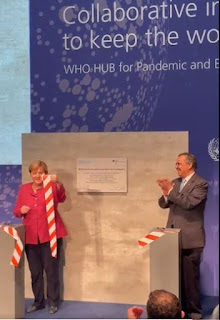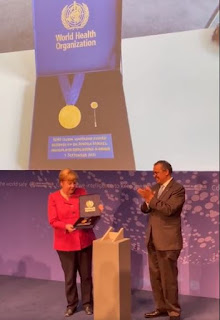WHO, Germany launch a hub for Pandemic & Epidemic Intelligence for faster data sharing and connectivity worldwide
The 1st of September
2021 marked itself as one of the most quintessential date in history to
commence a unique initiative by WHO and Germany at Lagenbeck-Virchow-Haus,
Berlin to fight global health uncertainties and catastrophe to save lives worldwide.
The COVID-19 pandemic inflicted
by SARS-CoV-2 collapsed the entire health system across the world from January
2020 onwards. The world faced a massive breakdown even after having most
advanced technologies and infrastructure worldwide. The lower income and middle-income
nations were greatly affected and suffered a huge wrath of COVID. And the fight
is still on.
While addressing the hall, WHO Chief, Dr. Tedros said, “The world needs to be able to detect new events with pandemic and epidemic risk management. The hub will be key to that effort, leveraging innovations in data science, harnessing the power of artificial intelligence, quantum computing and other cutting-edge technologies and fostering greater sharing of data and information between communities and countries.
The new initiative is part of WHO’s
Health Emergencies Programme that will encourage new collaborations worldwide,
drive innovations to increase availability of key data, develop state of the
art analytic tools and predictive models for risk analysis and link communities
of practice around the world.
Moreover, the hub will support
the work of public health experts and policy makers in all countries with the
tools needed to forecast, detect and asses epidemic and pandemic risks for
rapid decision to present and respond to future public health emergencies.
Emphasizing the significance of
data accessibility, Dr. Michael Ryan, WHO’s Health Emergency Programme said, “
Despite decades of investment, COVID-19 has revealed the great gaps that exists
in the world’s ability to forecast, detect, asses and respond to outbreaks that
threaten people worldwide.” He added, “The WHO hub for Pandemic and Epidemic Intelligence
is designed to develop the data access, analytic tools and communities of
practice to fill these very gaps, promote sense of collaboration and sharing
and protect the world from such crises in the future.”
The WHO hub based at Berlin will enhance
collaboration across the world to use the best technology and data to detect
and understand risks about future epidemics and pandemics. It holds the mission
to build a system of collaborative intelligence enabling better decisions to
avert and manage any global health emergencies.
Consequently, the hub will enable
innovators to co-create tools and used linked data that all countries need to prepare,
detect and respond to pandemic and epidemic risks, develop predictive models
for risk analysis, improve public health decision-making and monitor disease
control measures and infodemics through-
- Enhancing access and linkage across multiple data sources necessary to generate signals and insights on disease emergence, risks, evolutions and impact;
- Develop state of the art tools to process, analyse and model data for prediction, detection, assessment and response;
- Connect and catalyse institutions and existing networks developing disease outbreaks solutions for the present and future; and
- Provide WHO, the member states and partners with collaborative tools to underpin better and faster decisions on how to address outbreak signals and events.
The entire aspect of risk management
will be developed and adapted with the help of collaborative intelligence
approach that would also include technical governance, ethical and other
dimensions. Collaborative Intelligence is the essence of WHO’s new approach to
bring clarity to risk information and boost interaction with partners and stakeholders.
This novel approach will encourage global trust between countries by promoting
greater exchange intelligence to improve policies and decision-making for
pandemics and epidemic preparedness.
The WHO hub will work with a wide
range of data sources to better understand the context, occurrences and
predictors of epidemic and pandemic risks. The data sources will be included from
environmental factors such as rainfall and vegetation coverage, social factors
such as health seeking behaviour, health risk literacy and cultural beliefs
about disease causation and prevention; economic factors such as travel
patterns and trade consumption, production and sale of wildlife.
In an honour to recognise her outstanding contribution to the health of the world’s people, the World Health Organisation bestowed HE German Federal Chancellor Dr. Angela Merkel with the WHO Global Leadership Award. The German Chancellor hoped that the new hub would help the world be better prepared from any such pandemics and other global health emergencies and the benefit of the findings would be shared across all countries.
Meanwhile, the dignitaries
present during the event contemplated over the significance of the newly-found
hub for pandemic and epidemic risks and how existing disciplines can connect
each other in integrating, sharing and harmonising data to find a better way to
make the world a risk free zone.
The event was later concluded with a press briefing where the renowned dignitaries and officials addressed media and elaborated the mission and vision of the newly found hub for Pandemic and Epidemic Intelligence.
Courtesy and Attribute: WHO
#WHO #Germany #GermanGovernment #HubForPandemicandEpidemicIntelligence #Collaboration #Berlin #DataSharing #AI #Data #ToolsandTech #Preparedness #BetterWorld #safe #Health #HealthyPlanet #Life #COVID19 #WHOHealthEmergencyProgramme #AnalyticsandDecisionMaking
https://www.who.int/initiatives/who-hub-for-pandemic-and-epidemic intelligence/faqs; https://who.canto.global/s/VA3Q8?viewIndex=0







.jpg)

Comments
Post a Comment